There is no greater adventure any of us will undertake in our lives than becoming a parent. It's exhausting, exciting, terrifying, frustrating and wonderful all at once. Our little creations seemingly never run out of ways to infuriate us or make us smile as they develop their own unique personalities.
To call parenting 'challenging,' though, is the understatement of the century. There will be times when your progeny will try the very last thread of your patience. There will be times when you wonder what possessed you to bring a new life into the world - and what happened to yours!
Parenthood is one of the most rewarding journeys you'll ever take. On that road, you'll encounter many moments where you just don't know whether to laugh or cry. These artists have drawn a whole series of those moments. If you're a parent, they're bound to bring a smile to your face!
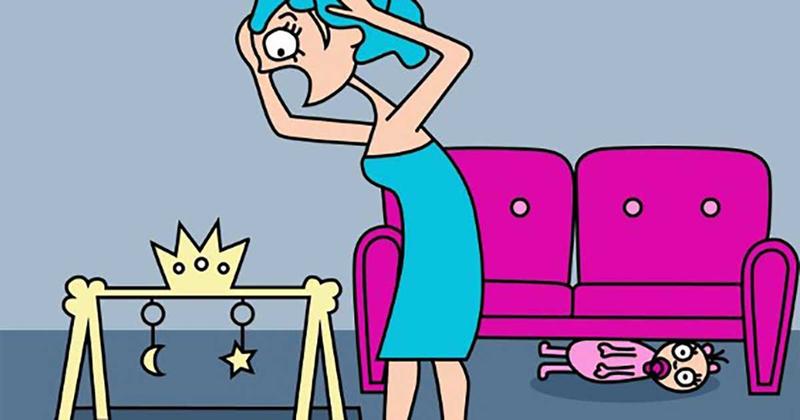
For a lot of parents, this occurs on almost a daily basis. Your child will say or do something that's wildly inappropriate, and your natural response to it is to laugh, but you can't. Laughing would tell the child that what they did is funny, and they shouldn't know that until they're older!

Unless you're raising a little angel, at some point you'll get a phone call like this one, and you'll be told that your child did something truly outrageous. Who among us didn't see someone at school moon the class during our education? You'll have to talk to them about it when you get home, but it's better to get all the laughter out of your system before you walk through the door. You have to set a good example, even if you know you would have cried laughing if you were there!
We want the best in the world for our children. We want them to be healthier than us, and happier than us. We want them to achieve more with their lives; to travel to more places, to earn more money, and to find greater fulfillment. One of the most important things we can teach our children is that if they want something and they truly work as hard as they can for it, then anything is possible.

Well, almost anything. There are few things more draining than trying to rein in a child who's hyperactive because they've taken in too much sugar. The occasional treat is fine, but nobody should have ice cream every day. Your child can have your heart, your soul, and the last penny in our bank account - but not another snack before bedtime!
Do you laugh every time you see someone on television or in the newspapers say how important it is that you get eight hours good sleep a night? They're hilarious, aren't they? We can only assume they've never had children. When your baby is young, they don't operate on your clock; you operate on theirs. That's not ideal when they're seemingly always so full of energy. If the sun comes up at 5 am, you can expect your young children to wake up with it and expect breakfast!

When it's time for them to go to school, though, they get more routine in their lives, and they begin to slow down a little. It's occasionally tempting, as per the depiction in this cartoon, to get your own back for all those long lie-ins you promised yourself you were going to have, but never got chance. Try to keep your evil delight inside your head, though. Wake them up with a smile instead!
One of the bonuses that come along with having children is that you learn to see the world through a child's eyes again. You've seen a thousand sunsets, but they haven't. Every new experience they have reminds you of experiencing the same thing for the first time yourself. You fall in love anew with the things that you'd long forgotten.

Children don't have concerns about social structures, or politics, or the state of the world. They're not worried about their next mortgage payment, or their job security. They're just growing, learning, and having fun. It's tempting to throw yourself back into that world yourself and just forget about all the baggage that comes along with being an adult. Unfortunately, you can't, but that doesn't mean it's not fun to sit with them and pretend that you can - even if it's just for a short while.
You'll never encounter a parent who thinks their baby is ugly. That's fair enough; it would be harsh to call any baby ugly, because they're all beautiful in their own way. Most parents though are completely convinced that their precious child is the most beautiful ever to have been born, and there's no telling them otherwise.

Sometimes, as seen in this drawing, you'll overhear another set of parents discussing how gorgeous their baby is. You'll peek a look yourself, and completely disagree. Then you realize that they're seeing the baby through rose-tinted glasses, so of course it's beautiful to them. Maybe you're doing the same with yours. Maybe you think your child is beautiful, but everybody else thinks it's hideous! We're sure they aren't, but it doesn't matter even if they were. They will always be beautiful to you.
We don't like to admit this to ourselves, but occasionally we'll take advantage of our own children's gullibility. Sometimes, a well-meaning lie is better than trying to explain a concept idea or trying to have an awkward conversation. Anybody whose child has asked them where babies come from before the age where it's appropriate to tell them will know exactly what we mean by this.

It isn't always just a case of lying to spare our own embarrassment though. Sometimes we lie because it's easier than having an argument. Trying to explain to a young child that having McDonald's every day isn't good for them is asking for a fight you can't win. Just have them believe that it doesn't open every day of the week until they're old enough to find out for themselves. It's better for everyone that way!
If you were left alone in a room with a tin of paint, some string and a plate of hot food, and then asked to make a mess, you'd probably take a pretty good shot at it. You might throw the food on the floor or at the wall and use the paint to draw some stick people. You'd consider putting the string in the paint and then leaving it everywhere. That would still be nothing compared to the formidable force of destruction a small child is capable of.

We don't know if it's a magical power, but children can create incredible amounts of mess with minimal resources. They can make a small bowl of soup cover an entire room. They can make one crayon last long enough to color in a whole wall. Worst of all, it feels like they can do it faster than the eye can see! All you did was check your phone for thirty seconds, and now you have a cleaning job that's going to take three hours.
Have you ever taken a second to think about why you dress the way you dress? We don't mean when you're at work, where you might be required to wear a uniform or dress to a particular style, but the way you dress when you're at home. Unless you're a free spirit, you probably wear similar clothes to your friends, and the other people around you. It may not always have been that way; you might have been a punk or a goth when you were a teenager, but eventually you settled into a fairly standard style, probably influenced by societal norms.

Children have no such limitations. If they want to wear a neon pink t-shirt with orange shorts, they're going to do it. If they want to wear a dress covered in glitter to go to the shops, then that's what they're going to do. Accepted or normal styles of wearing clothes haven't occurred to them yet, so let them express themselves however they like. Even if it does hurt your eyes!
Babies are never more adorable than when they're first born. They don't make noise, they don't make a mess, and most of the time they're asleep. They need our help with everything, and they love us unconditionally. When they're a little older and start to become more independent, we miss those days, and so we have another child. Besides, it will be good to have another family member to keep them company, right?

Well, mostly right, but often very wrong. When you have a second child, your first is no longer the unquestioned center of your universe, and they have to learn to compromise. That's not an easy lesson to take on board when they're used to having your undivided attention. Children with siblings learn about negotiation and compromise at an early age, so it's good for them in the long run. In the short term, it can be very stressful for you!
Here's something else we don't often like to admit; all parents have had a brief fantasy, however fleeting, of just leaving their child with someone else and running away for a while. You used to have a life of your own, after all. You could go out with your friends whenever you wanted. You got a full night's sleep. A full day's work was as tiring a thing as you ever did. Life was simpler, and it sometimes feels like it was happier, too.

The feeling doesn't last, of course. We'd never abandon our children, and they bring us more joy than they do pain or stress. When they're screaming in the middle of the shop, though, and everybody else is looking at you, you wouldn't be human if you didn't quietly wish you could make them somebody else's problem for a while.
Children play with toys. You did when you were a child, and so did your parents before you. We like to spoil our children, and so we feel inclined to go out and buy them the latest and greatest in playthings. There's only one issue with that; very young children have no concept of what's supposed to be a toy and what isn't, nor how much money you've spent trying to entertain them.

Children take a while to develop a sense of danger, and when they're young the whole world around them is theirs to play with. Sometimes that can take the form of cardboard boxes, as if they were cats. Other times, it will take the form of something potentially dangerous. They don't understand why we're telling them off, but these are valuable lessons to learn.
It's often said that young children and animals have a lot in common, and here's an example of how that plays out. If you have a dog, and you open a pack of its favorite biscuits, it won't be long before the dog is at your feet, staring up at you hopefully. The same is true with children and their favorite treats.

Portion and appetite control aren't strong suits among infants, and they'll often eat until they make themselves sick. Then they'll be upset afterward! If you're eating something - especially a treat- they'll not only want but expect a little something themselves. That means you have to learn to keep your own treats not only out of sight, but also out of hearing range of your stealthy and observant offspring. You'll never enjoy a bar of chocolate in peace again!
Waiting for your child to say its first word feels like it takes an eternity. They learn to communicate with sound very early on in their lives, but it takes much longer to frame those sounds into words that can be understood. We patiently teach and coach them, hoping that it will be our name they say first. We repeat it to them over and over again.

Once they've learned it, that repetition can come back to haunt us. Now they know your name, they're not afraid to use it any time they want something. In some cases, they'll use it when they don't want anything at all. How many times have you been sat in another room, hearing them call for you over and over, and lamenting the fact that you ever taught them how to talk in the first place?
This one isn't so much about your relationship with your baby as it is about how much the people around you love babies. Friends, relatives and especially parents are very keen for you to progress with your life. They have a plan for you that starts with meeting a partner, then moving on to marriage, and then finally to having children of your own.

Providing your parents with grandchildren will delight them. As your baby starts to grow, though, you might find that they're already looking forward to their next grandchild even if you're not ready for it. The constant questioning of your future plans can become more than a little irritating. You just have to remember that they have your best interests at heart, and they want you to be happy. The fact that they want another baby in the family is only a tiny part of it, we're sure!
It's often a case that a man doesn't become aware of how vulnerable girls are in society until he has a daughter of his own, at which point he becomes the most protective person in the universe. Often, what he wants for his daughter the least of all is for her to end up dating someone like him when she's old enough! He might also have to learn some new habits, too.

Very manly men have probably never painted their nails or had their own painted. Their daughters don't really know or care too much about that, though. They want to play beauty salon today, and if mom isn't around, then dad will have to do. There's no point fighting against it; you might as well just look at it as learning a new skill.
Biology means that women have to do 99% of the hard work when there's a baby on the way. However much effort dad puts in after the birth, and however supportive, caring and considering he might be during the pregnancy, mom is still the one who has to carry the extra weight, feel the physical strain and go through a potentially hazardous birthing process to bring a child into the world.

It probably does, therefore, feel a little unfair when a baby emerges into the world, and very clearly has its father's face. That feeling isn't helped very much when friends and relatives come to visit, and say helpful things like 'Oh, don't they look just like their daddy?' Try not to let it worry you. Even if they have got their father's eyes, nose or cheeks, physical resemblances tend to balance out over the passage of time.
There's a little bit of stereotyping going on in this picture, but most stereotypes contain at least an element of truth, so we're going to allow it. As any good police detective will tell you, the best way to break a suspect down in an interview is to play 'good cop, bad cop.' It works in parenting, too.

If mom is the person who does most of the nurturing and caring, and the first person that a child comes to for a cuddle when they're upset, then the child doesn't associate them with discipline or tellings-off. That can often be when dad gets involved. Mom might be the one who allows a little leeway when it comes to bedtime, teatime or bath time, but when dad raises his voice, it's time for everybody to fall in line.
When people say that having a child takes over your whole life, they really mean it. For their first few months, they need you around them pretty much 24/7. When they're a little older, your day has to be planned around their school day, and their social events. It doesn't leave you with a lot of time to catch up with your own friends and family.

When you and your friends have children of similar ages, the problem becomes even worse. You might be free one day, but your friends aren't, and vice versa. Arranging to meet someone for a night out becomes almost a military operation, requiring delicate planning and weeks of notice. Remember when you could get a text message inviting you out, and you could accept it and be out half an hour later? No, us neither.
If you don't arrange those nights out and social occasions at least semi-regularly, you could find yourself with this problem instead. You're so used to caring for your child, or adapting your life to fit around children's activities, you actually forget what you used to do with your free time before you became a parent.
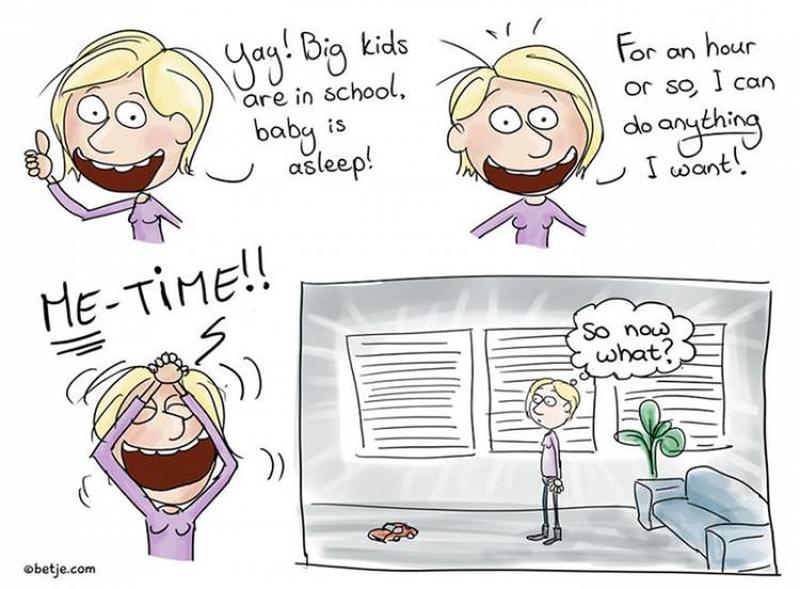
This is even more likely to happen if you have children a few years apart. Just as your eldest is beginning to become independent, you start the process again with a new infant, and now it will be years before you can even contemplate a lazy Sunday. This is why it's good to make time for your hobbies and stay in touch with people. Arrange a babysitter and make sure you get some 'you' time, before you lose touch with how to make use of that time.
Babies and young children are usually quite happy doing whatever it is they're doing right now. Any attempt to take them away from whatever that thing is can be met with tears and tantrums, even if it's something that's in their best interests, like having a bath.
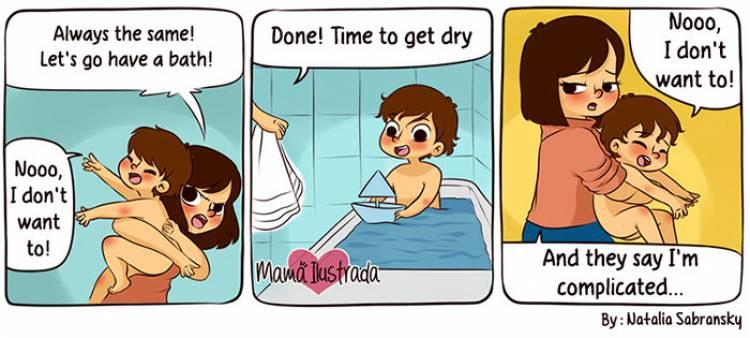
Once you've wrestled with your child and got them into the bath, they'll be perfectly happy again - especially if they have bath toys to play with while they're in there. Now you have a new problem; you need to get them out again, and you're going to have to repeat the wrestling match. Children are contradictory by their very nature. It won't be long before you're plucking them out of the water and toweling them down whether they're crying and complaining about it or not! Top tip: Bribery almost always works.
This is a spoiler for those of you who don't have children yet; your child will be 'on you' constantly. They want to be carried in your arms when you go outside. They want to sit on your knee when you're at home. They want to hold your hand when they're old enough to walk, and they may even still want to sleep in your bed when you come home. Even the most mild-mannered parent can become weary of the constant proximity, but try to cherish it because one day, they won't want to do it anymore.
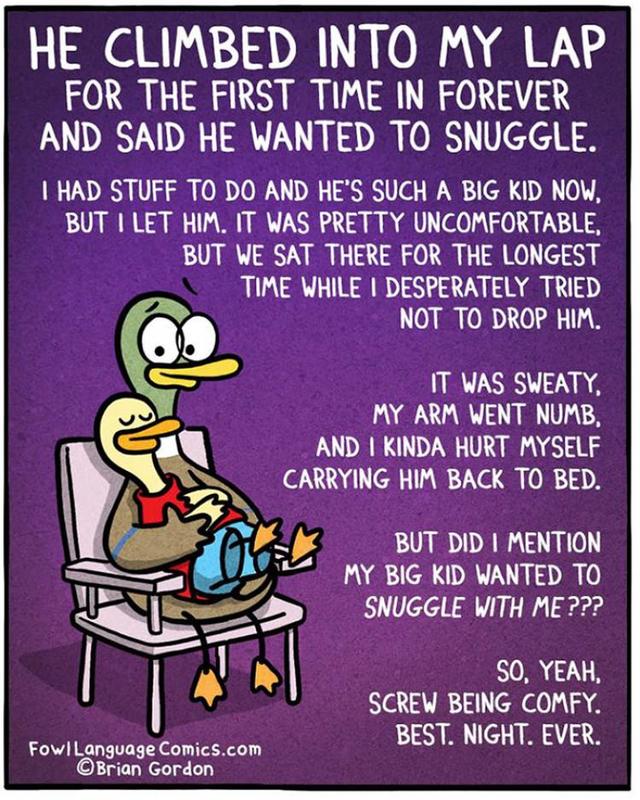
One day, your child will grow up, and they'll think they're too big for cuddles. They'll grow too large to sit on your knee. They'll be too independent to sleep in your bed. So, make the most of it, no matter how inconvenient it sometimes is. These days won't last forever, and they'll never come again.
This is an issue that only affects the most recent generation of parents. When you were growing up, it wouldn't even cross the minds of your parents to grab a photo or a video of your every move and upload it onto social media so the whole world can see it. Nowadays, every 'first' in a child's life becomes public property. Their first smiles, first words, and first steps are uploaded onto the internet for posterity. Some parents even create social media profiles for their children!

Try to remember that your child or baby has never asked to become a social media star, and don't get so caught up in looking at them through a lens that you forget to watch them through your own eyes. Photos and videos are fine mementos, but the way you see them when you're looking at them without a screen in a way is entirely different. Those are the moments that truly create memories, and the memories should be yours and yours alone.
At the risk of stating the obvious, having a baby is a massive commitment. It's also a lifetime's responsibility. You get a little help for the first day or so while you're still in the hospital, but then it's over to you to keep this baby alive for the rest of its childhood and adolescence. If you've never done that before, you panic at the slightest unusual noise. Worse still, you panic when there's a lack of noise!
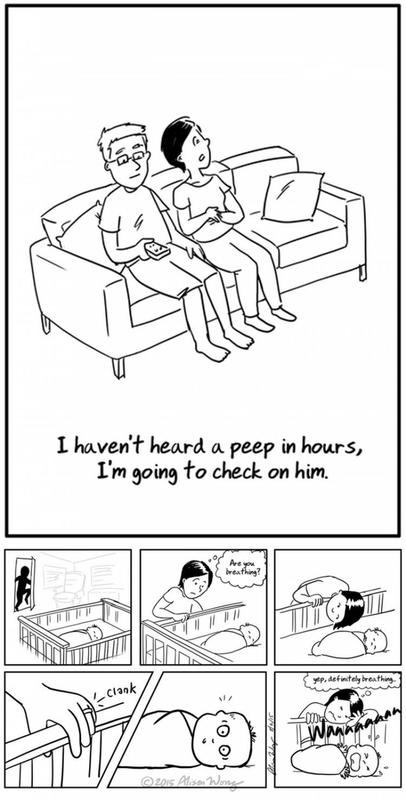
Sometimes, a quiet baby is just sleeping. That won't stop you from worrying about it, though. When you worry, you go in to check. When you go in to check, you're probably going to wake your sleeping baby up and have a grumpy, tired, crying monster on your hands. After a while, you have to persuade yourself somehow to take a step back, and trust that your newborn isn't going to turn into dust the moment you turn your eyes away.
It's a sad truth that the moment a child has learned how to talk and communicate, it's not far away from learning how to lie. Children are far smarter than most people give them credit for, and they're more than happy to use ambiguity to their own advantage. Trying to persuade a child to brush their teeth is a regular battle for a lot of parents. If you show them the hint of a way out of it, they'll take it.
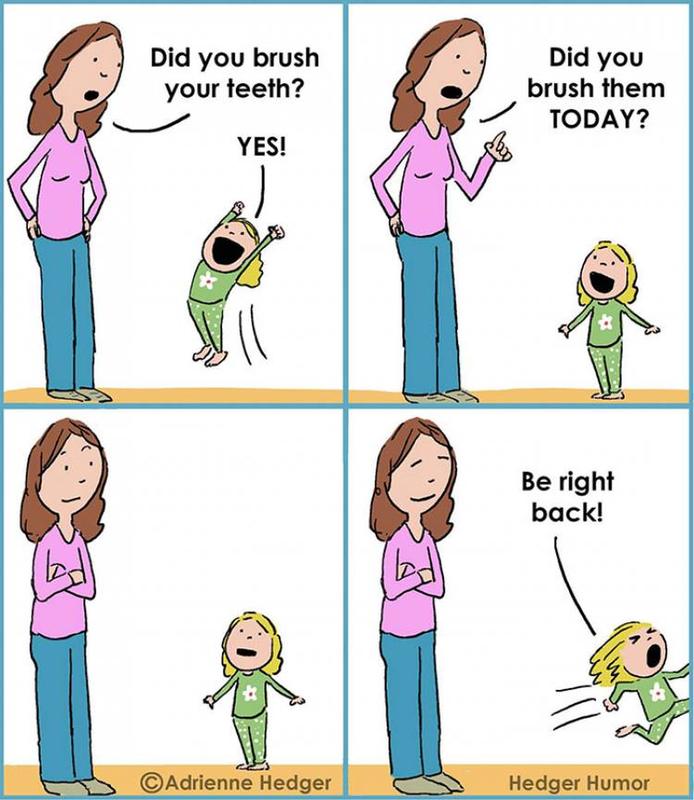
If you're asking your child if they've cleaned their teeth, their bedroom or themselves, make sure you specify exactly when you expect them to have done it. The same applies to chores, homework or just about anything else. If you ask them a vague question and they give you a vague answer they haven't lied to you, they've just stepped through the loophole you provided to them.
You often don't need to worry about remembering exactly when your child is due back to school after the holidays; their behavior will tell you. In that final few days, your child will be grumpy, frustrated and upset. They love their breaks from school, when every day is a play day and nobody's trying to teach them math, but what's a holiday for them is often the complete opposite for you.
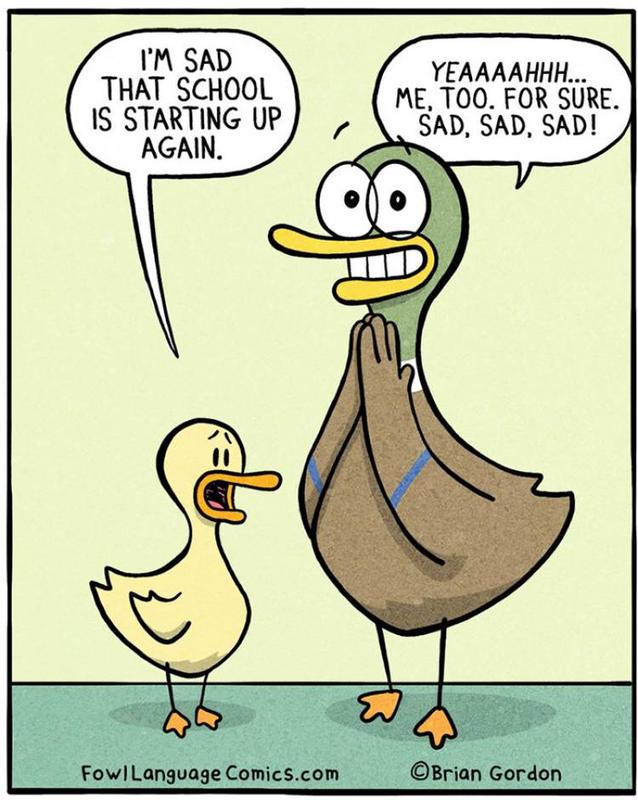
Without school to provide them with a structure, your child is now mainly looking to you for entertainment. You'll be expected to provide them with an itinerary and something to do on a daily basis. You can go on a family vacation, but that's still likely going to leave you with some time to fill. You'll love having your babies home with you for the first few days of the break. By the end of it, you'll be impatiently counting the hours until you can take them back to the school gates and have a break of your own.
Given the conversations and debates that are going on in the media and in politics at the moment, it's never been more important that your children learn about consent at an early age. Their bodies are their own, and they shouldn't allow anyone else near them if it makes them uncomfortable. The same is true whether your child is a boy or a girl.
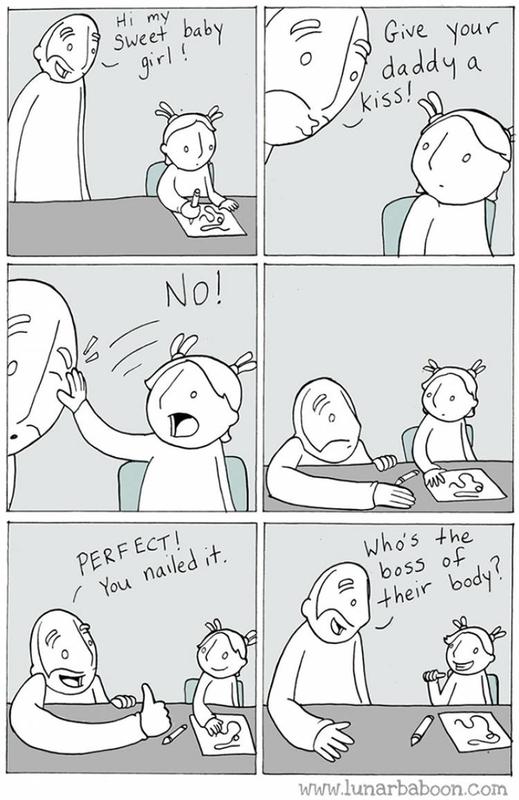
You have to remember that this also applies to you, too. You may desperately want to bundle your child up into a cuddle and smother them with kisses, but if they clearly don't want to, you shouldn't push the issue. They have to learn that it's OK to say no, and that if they say no, whoever wants to touch them should stop. It will teach them to enforce their own right to stay free of harassment in later life.
You know more than your child does. Parenting would be extremely difficult if you didn't! As far as your child is concerned, you're the wisest soul in the whole universe, and the person who can answer all of their questions. They'll take anything you tell them as gospel truth, and they may even form opinions based upon your answers.
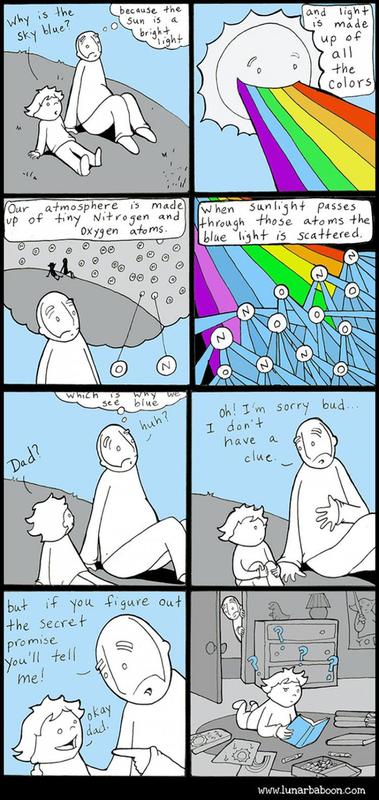
Telling them something, though, is no substitute for them learning it themselves. There's no harm in telling your child basic answers to basic questions, but they should also be encouraged to inform themselves via research and form their own perspectives based upon that. More importantly, you should never give your child an answer to a question if you're not sure of it. They may accept it as fact and spend half their life believing it! Encourage them to read and learn, and to tell you what they've found out.
When we feed our babies, they're likely to get food all over their faces, their hands, and the surrounding area. They don't have to worry about that though, because you'll clean that up. When they're a little older, and they're eating 'grown up' food with the rest of the family, they still don't have to worry about cleaning up. You'll take the plates, the cutlery, and any food wrappers, and you'll wash or dispose of them as appropriate.
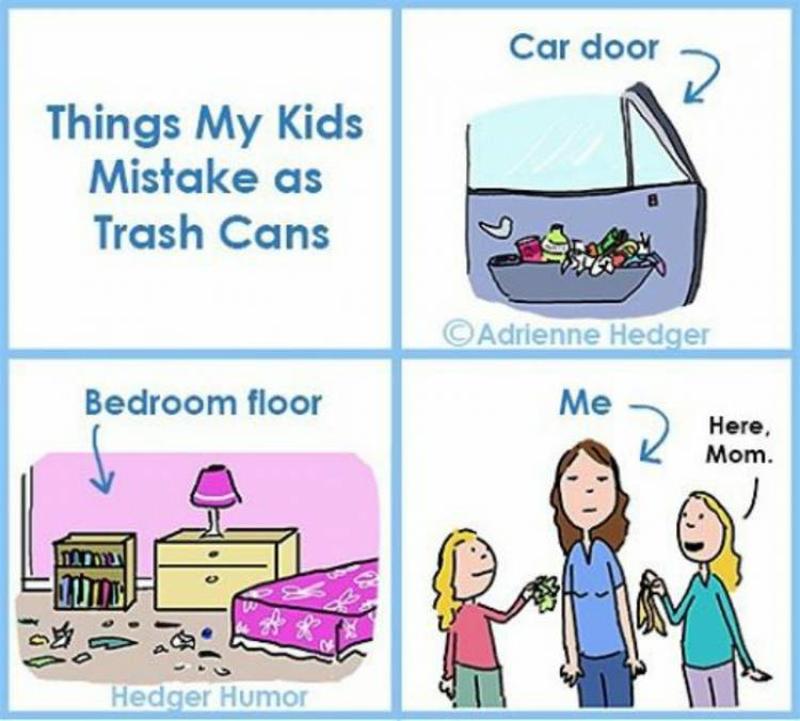
You have been disposing of your child's waste since they were born. That's programmed them to expect you to do it for them. That means sticky wrappers and other bits of trash are likely to get handed to you for you to get rid of, rather than taken to the bin. When they can walk and talk, point out the bins and tell them you expect them to use them!
It's perfectly normal to be a little squeamish of bodily fluids and functions when you don't have children. Very few people would choose to watch someone else go to the toilet, and you certainly wouldn't offer assistance with basic hygiene functions.
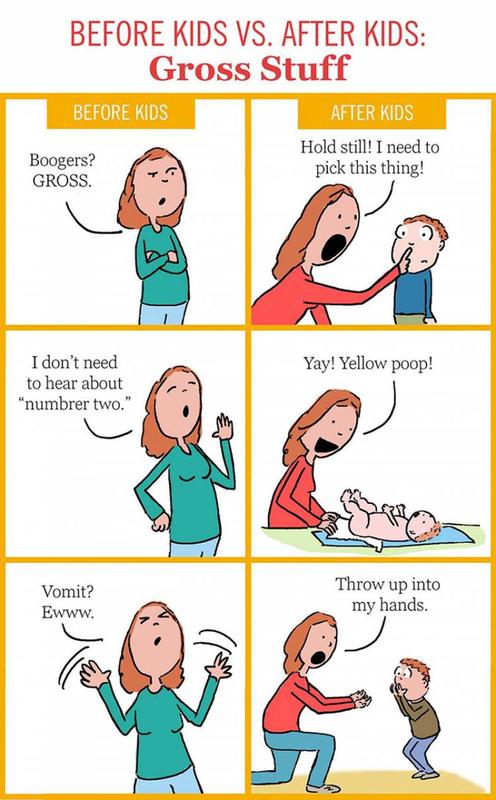
Somehow, all of that reluctance magically goes out of the way when you've had a child. Your child could projectile vomit all over your face and hands, and you'd just calmly shrug and wash it off. The most disgusting of bodily functions become completely routine. You think nothing of picking their nose for them in public. This seems to happen automatically. Maybe it's better that way; it means you don't have to think about what you're doing too much. By the time you've changed your hundredth diaper, you've seen it all, and it's officially no longer possible to shock you.
You might be familiar with the concept of Schrodinger's Cat; it's a scientific experiment which demonstrates that under certain test conditions, if a cat is sealed into a box and nobody can see it, it can be perceived as alive and dead at the same time. In a similar way, your child's stomach is both simultaneously full and empty every minute of every day.
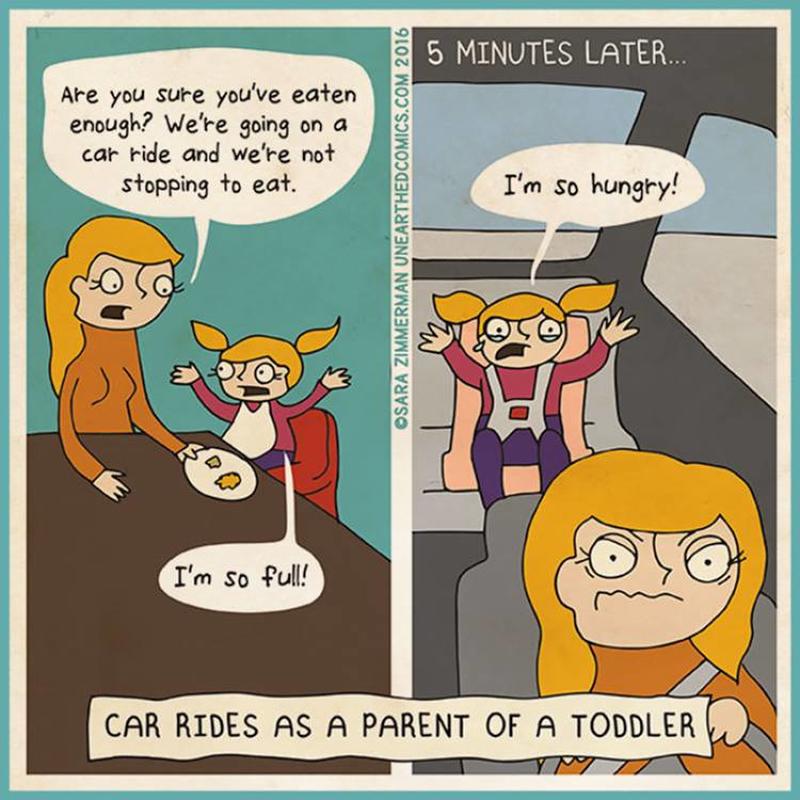
Your child will stubbornly insist that they couldn't eat another morsel, and then expect to be fed if something more interesting than their last course arrives on the table. You'll ask them if they need to eat anything before you set off away from the house and they'll say no, and then they'll be hungry five minutes later in the car. Unfortunately, the same phenomenon also seems to affect their bladder. Always carry car snacks and know where toilets are!
You almost certainly have a favorite movie. Most people do. You've probably watched it a whole bunch of times, too. How many times would you say you watch it each year, though? Once? Maybe twice at a push? Three times if you're going through a rough time and you watch it for comfort? You don't love films as much as your children, then. They could sit through their favorite movie or TV show three times back to back, and still want more.
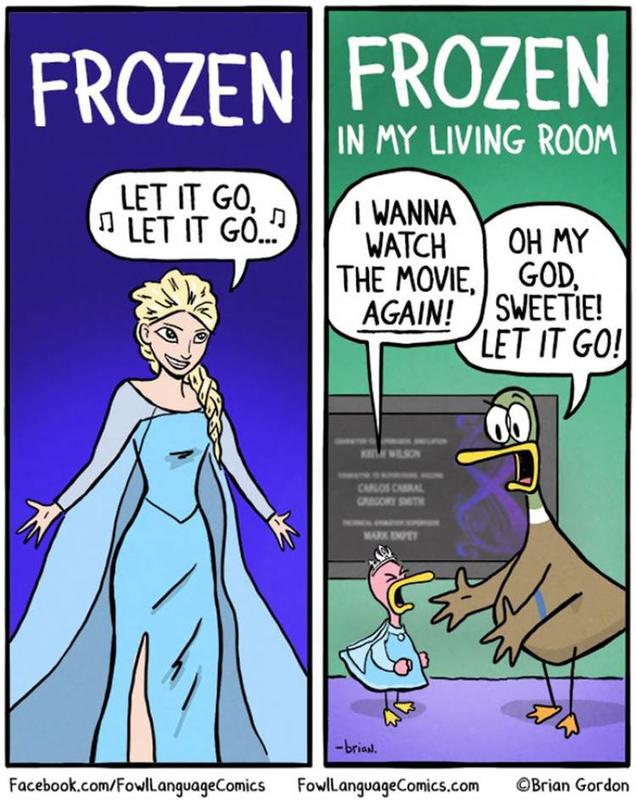
If an adult watches the same thing on repeat, they'll quickly get bored. Children don't; they just get entranced by the magic and wonder of it all every single time. That means you better get used to seeing the same children's movie a hundred times between now and this time next year. If they're the sort of child who goes for Disney films, the soundtracks will now be in your head forever.
When you've welcomed a new baby into the world, you and your partner aren't going to have a lot of time for each other anymore. You'll be together constantly, especially during the baby's first few weeks, but it won't be quality time. Every waking moment will be all about the baby. The idea of going on a date will become laughable.

Later on, when they sleep through the night, it might be possible to squeeze in a mini-date at home with a bottle of wine and a film. Don't expect to see the end of the film, though. You're both far more tired than you realize. As soon as you get a second to relax, you'll find that your body will likely respond by going straight to sleep. This is why it's important to get out of the house occasionally for proper date nights, like you used to have.
There's always been a truism about this picture, but it's become even more accurate since Instagram and Facebook ventured into our lives. If you don't have children yourself, and you haven't spent a lot of time around a young child in the family, you only get to see the best things about parenthood. You see the photos your friends want to show you, and you hear the stories that they want to tell you.
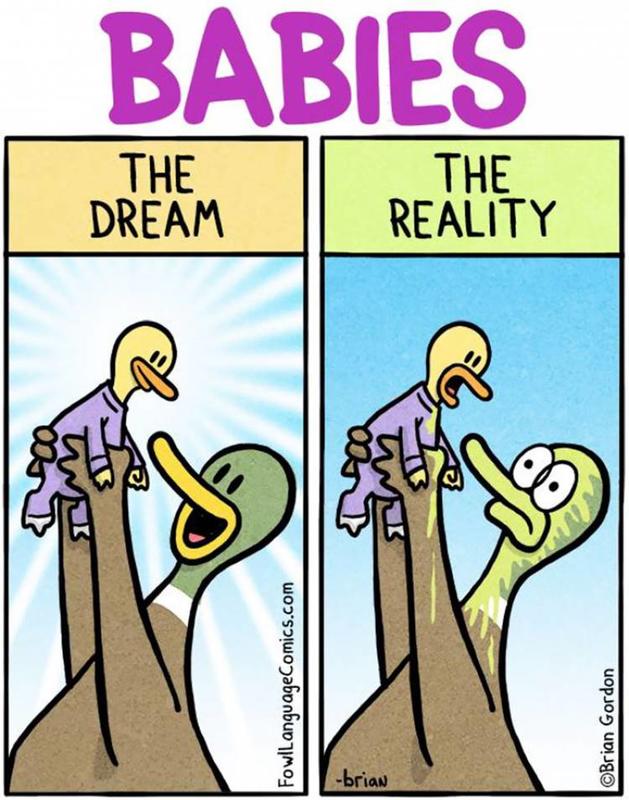
What you're hearing is a censored, redacted version of the truth. Nobody wants to tell you the story about when they got covered in baby poop without warning. You're not seeing photos of your friends frantically scrubbing vomit off their work shirts ten minutes before they leave the house. Having a baby is fantastic, but it's certainly not all sweetness and light - and it's definitely not all clean!
'Life knowledge' and 'school knowledge' are two different things. While you're in the education system, you'll learn all about complicated mathematical equations, the periodic table, chemical formulas and focused areas of history. Unless you go into one of those fields, you'll never use that knowledge again. It eventually gets replaced in your brain by more important information, like how to operate a spreadsheet.
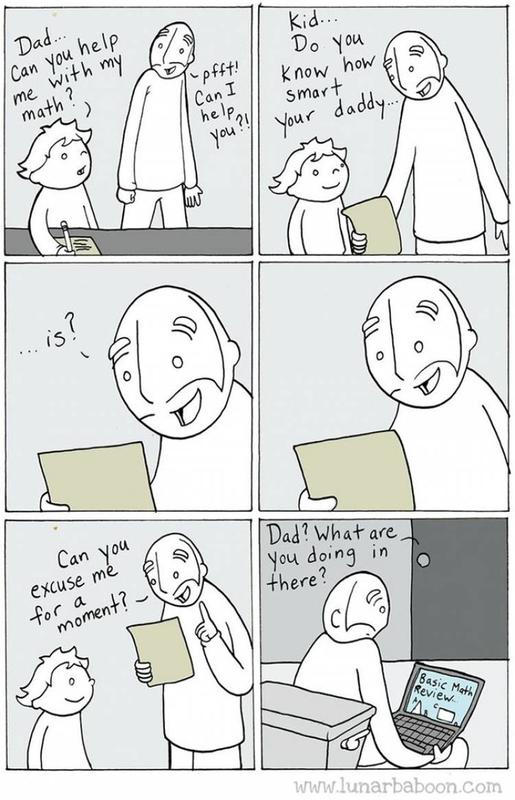
That has the unfortunate consequence of making you seem stupid when your child wants help with their homework. You might vaguely remember being taught the same things when you were at school, but you can't remember how to do them. Now you look like an idiot in front of your child because you can't remember how PEDMAS works, or the principles behind long division. How embarrassing! Maybe it's time to take an adult learning course, just to avoid the shame.
You may have had one or two close friends before you had children, or you may have had eight or nine. No matter how many you had, you likely didn't seem them properly for quite some time after you became a parent. Your child became your whole life. You occasionally worry that they've forgotten about you, so it's always nice when you're invited somewhere.
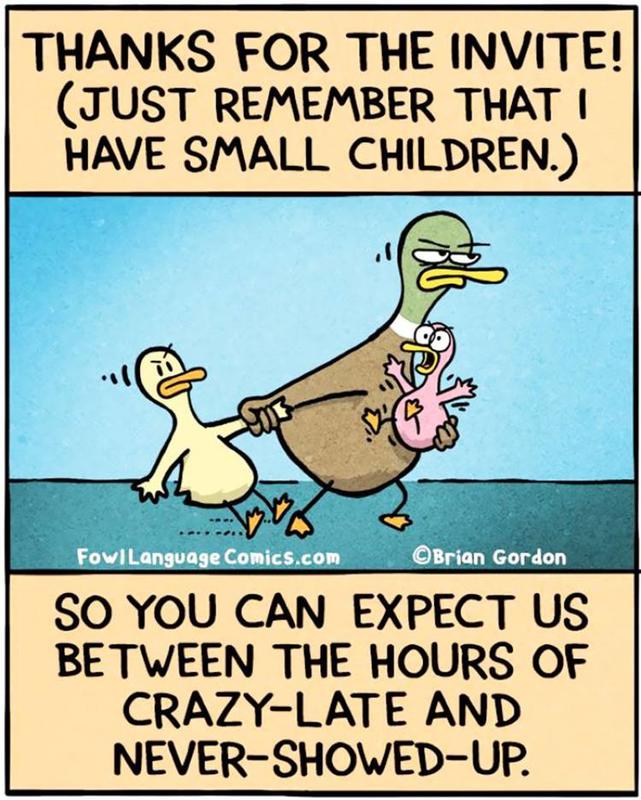
Getting the invitation doesn't actually mean you can go, though. There's the logistics to think about. Is a babysitter available? How long can the babysitter stay for? What needs to be done to get your child ready for the babysitter before you go out? There's so much to think and plan that it becomes exhausting. Get used to canceling and forget any notion of turning up to anything on time. Hopefully, your friends will just be happy you showed up at all.
A nagging child possesses a lot of power. No matter how much resolve you have, the constant 'I want that!' wears you down over time. Occasionally, that means you'll acquiesce and buy your child something that they spotted out of the corner of their eye when you were out shopping. At that moment, it's the most important thing in their whole universe, and they simply can't imagine life without it. It's just not worth the argument to say no.
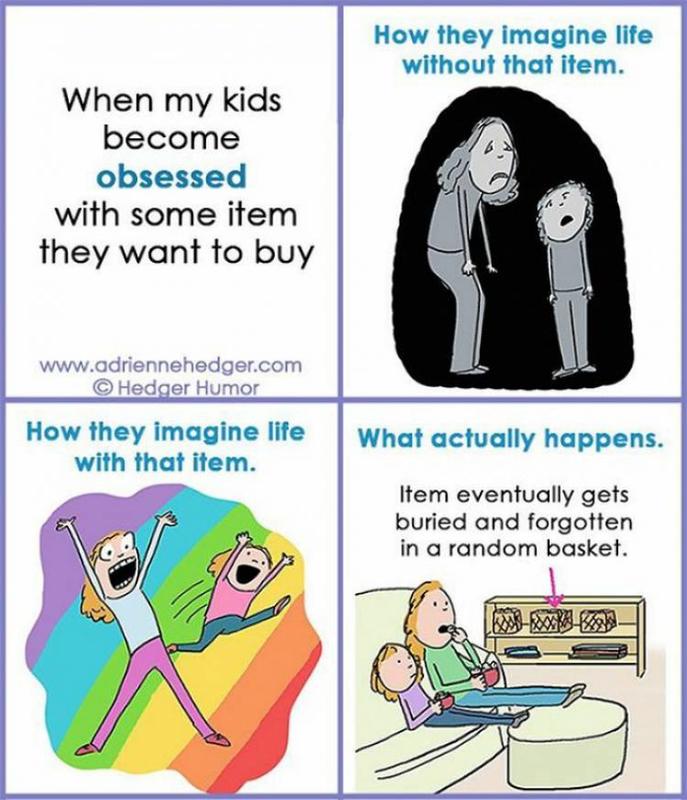
Two weeks later, the fascination has passed, and whatever the must-have item was is now under a bed, or in a draw, or behind a cupboard. Two weeks beyond that they'll forget they ever had it all. It doesn't matter to them though, because you're going to the shops again this weekend, and they're bound to spot something else they just need to have. The wonderful process all begins again!
We go through a cycle in our lives. When we're born, we have no concept of tidying up. As we grow, and we're taught to clean up after ourselves, we find that everything has its place, and we start to take pride in the appearance of our homes. Then, we have children, and everything changes.
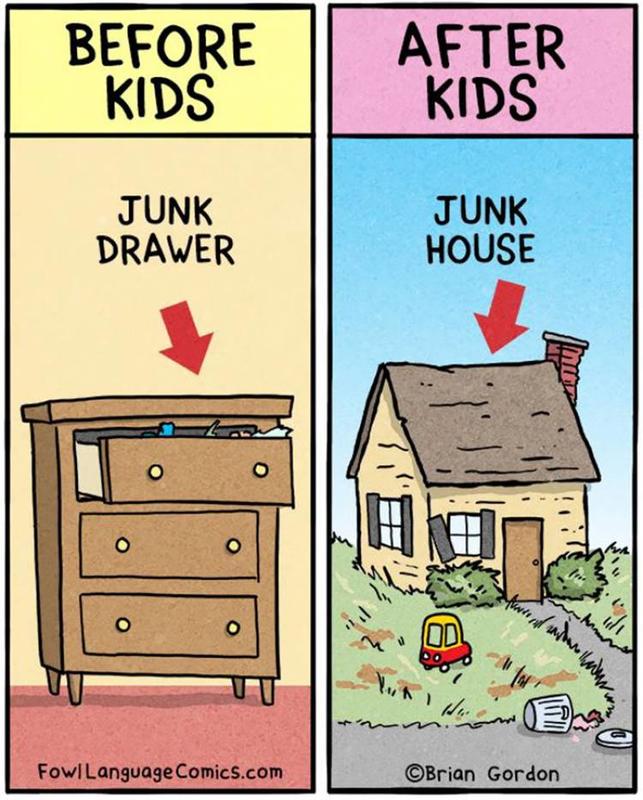
There is now no longer any value in having intricate filing systems, specific bins for specific types of waste, drawers that are only supposed to have one kind of clothing in them, or even the expectation of a clean floor. Your child is a tornado, tearing through your house daily and leaving it in disarray. You slowly accept that there's no purpose in trying to tidy anything anymore; it will all be out of order and in the wrong place again tomorrow whatever you do. In that way, you've regressed back into childhood yourself!
We already said earlier on that you'll spend the earliest part of your child's life wishing it could talk to you and call your 'Mom' or 'Dad,' and then you'll find yourself hoping in vain for a precious hour of silence. If you think the constant 'mom, mom mom' shouts are insufferable, though, then we have bad news. One day, your child is going to discover the power of 'why.'
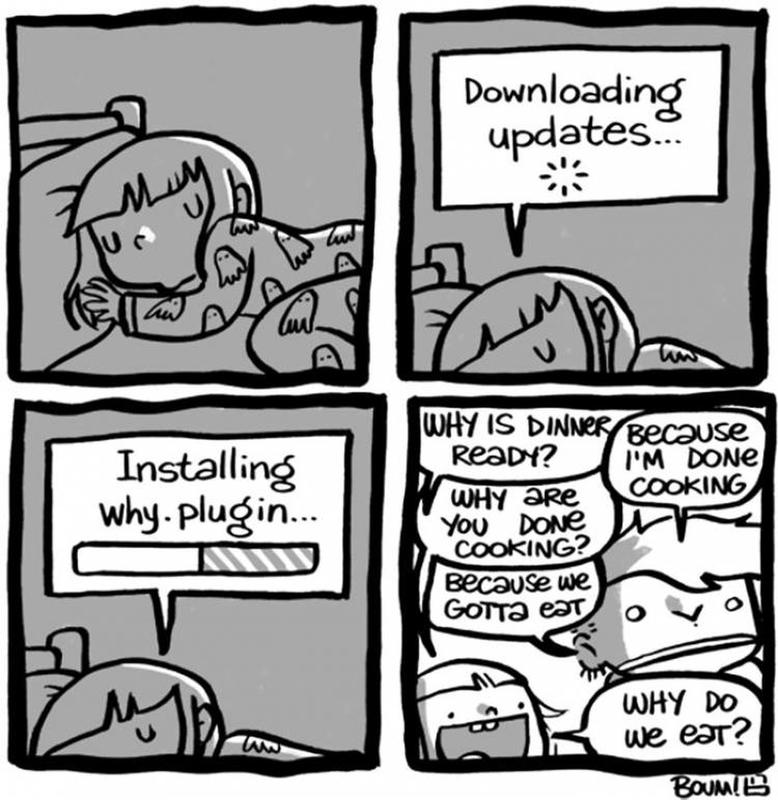
Children have an insatiable curiosity. When they start learning, they never want to stop. They want to know why everything is how it is, what it's made of, how it works, why we do the things we do and everything in between. No matter how you answer any of their questions, there's always another 'why' coming after your explanation. You've never had an existential crisis until you've tried to explain to a five-year-old why there's something instead of nothing.
Here's yet another thing that small children have in common with cats and dogs: They'll spend extended periods of time staring at something that only they can see. Occasionally, and more worryingly, they'll even smile and laugh at the invisible space, as if they were somehow interacting with it. What are they looking at, and why is it so hard to attract their attention away?
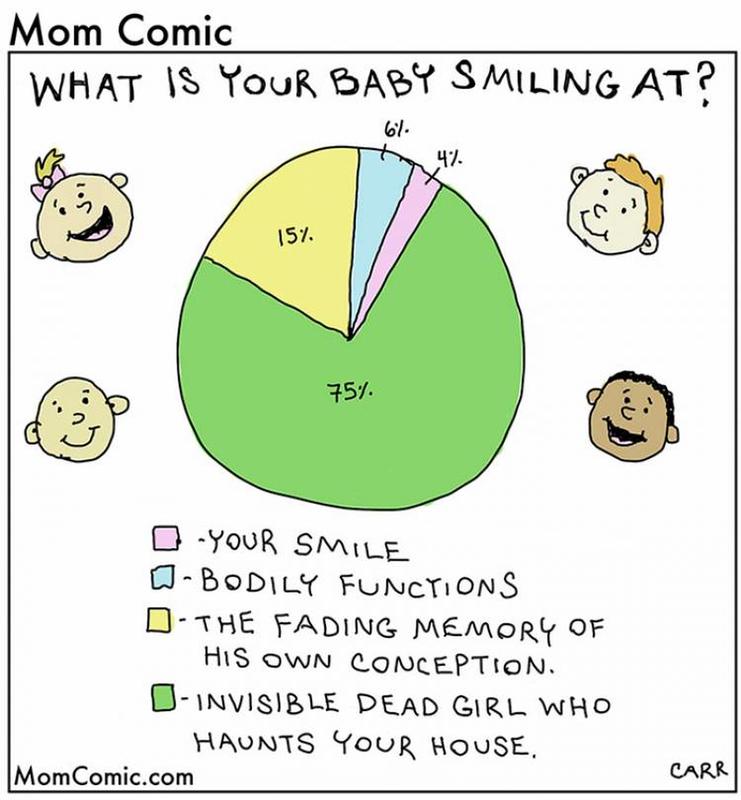
There are some who say that children are aware of things that we can't see, and that when we grow up, we forget the phantom visions we had as children. There are others who say that it's normal for children to have imaginary friends when they're very young. It may very well be, but we wish there were some way to be sure that their imaginary friend really is imaginary, and not the specter of some long-dead ghost who's sharing your living space with you.
It's always a happy moment when your baby is big enough to sit at the table and join you for a meal, or at least it's happy for about thirty seconds. That's how long it's likely to take you to realize that your little treasure now has access to the full range of plates, condiments, and cutlery on the table, and has no qualms about throwing them whenever it pleases.
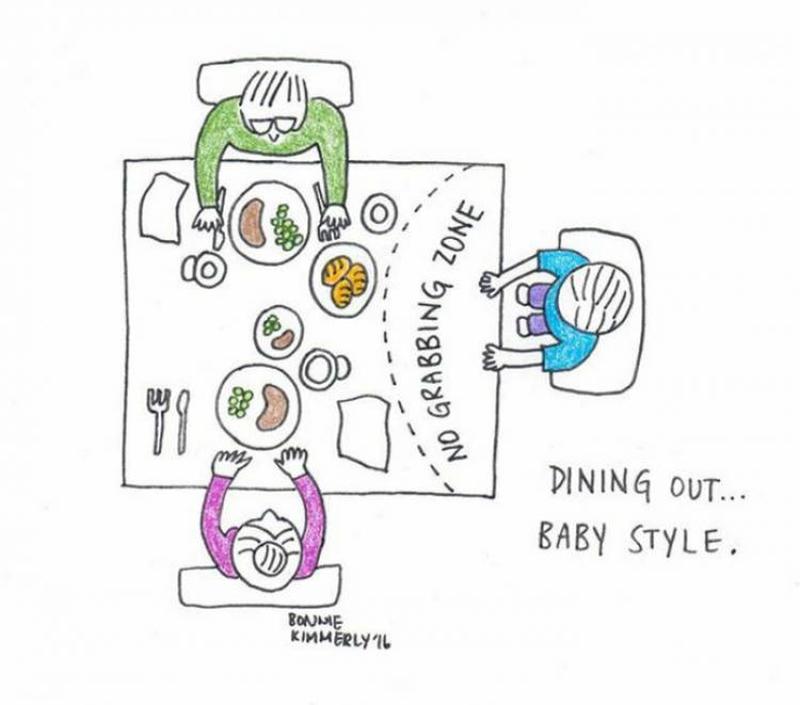
When adults sit and dine together, you can go elbow to elbow. So long as there's enough room to eat your food in comfort, it's a case of 'the more the merrier.' When there's a child involved, they need their own exclusion zone to keep things out of their reach. That means they now have most of the table space to themselves. They didn't come to share your table with you; they came to rule it.
Your child is totally dependent on you. You are their sworn provider and protector, both when they're young and any time they need you for the rest of your life. When they're young, they'll welcome this. When they're a little older, they'll start searching for a partner of their own, and their affections will begin to shift to other people. You'll find yourself both weirdly jealous, and more protective than ever.

Nobody is ever going to be good enough for your little girl or boy. The moment they bring their first partner home, you'll find yourself micro-analyzing their every word and movement and questioning all of their motives. You're ready to unleash the full force of your wrath upon them if they ever dare to harm your baby, and you may not even be shy about telling them that. It may sometimes make you feel like a monster, but it's the same way your own parents felt about you!
A lot of the pictures we've seen so far make reference to the fact that children dominate your life. This one goes a step further, and it's more accurate than you might assume it to be if you don't have a child of your own. Because you're on care-giving duty 24/7, days have a habit of merging together. The days become weeks. The weeks can, if you're not careful, turn into months.

When did you last have a shower? When did you last cook a meal for yourself? When did you last even leave the house? It's probably longer ago than you think. You're not consciously neglecting yourself; this is just what happens when you're so focused on your new arrival. Start setting reminders on your phone so you don't forget to do basic things. You'll be glad of the help when the alarm goes off!
Getting to the point where a child can sleep through the night unattended is a real struggle. Some people find this to be the most challenging part of parenthood, because you're permanently in a state of complete exhaustion. You keep pushing on, knowing that one day they'll drift off for hours on end, and you can start the process of repairing your shattered sleeping patterns.
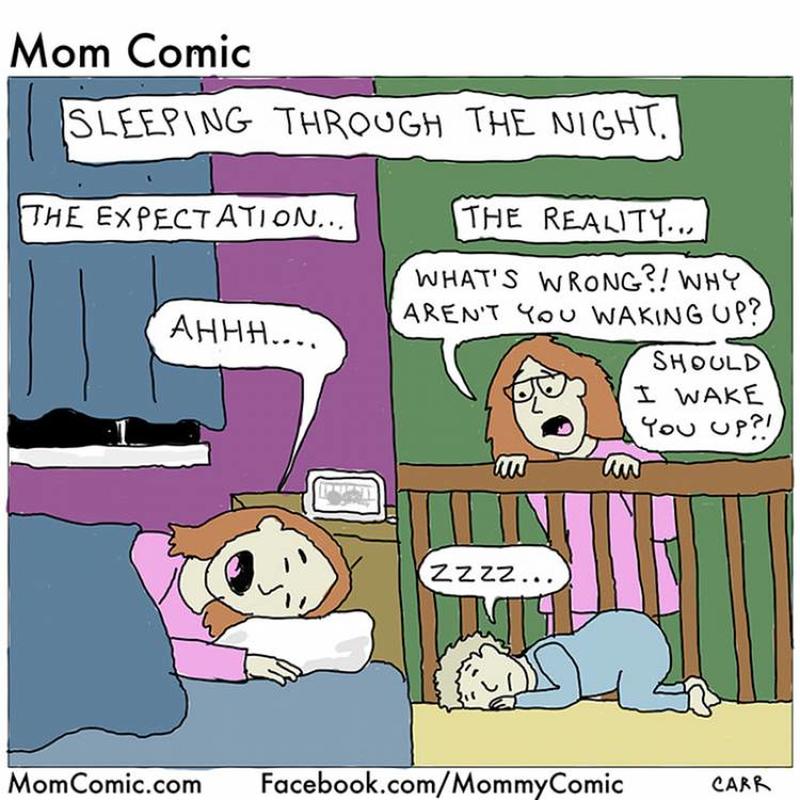
That's not how it works at first, though. The first time your baby ever does sleep through the night, you'll presume something has changed. What's wrong with them? Why aren't they waking up? Should you wake them up just to make sure everything's OK? In the end, irony of ironies, your child will end up having a much better night's sleep than you do. Then they'll be even more full of energy the next morning while you're no better off.
Your role as a protector won't always be appreciated by your child. It's not an issue before they're able to walk around independently, but from that point on they see you as a prison guard, always stopping them from doing the things they want to do. Why can't they touch a hot stove? Why can't they go to the park on their own and see their friends?
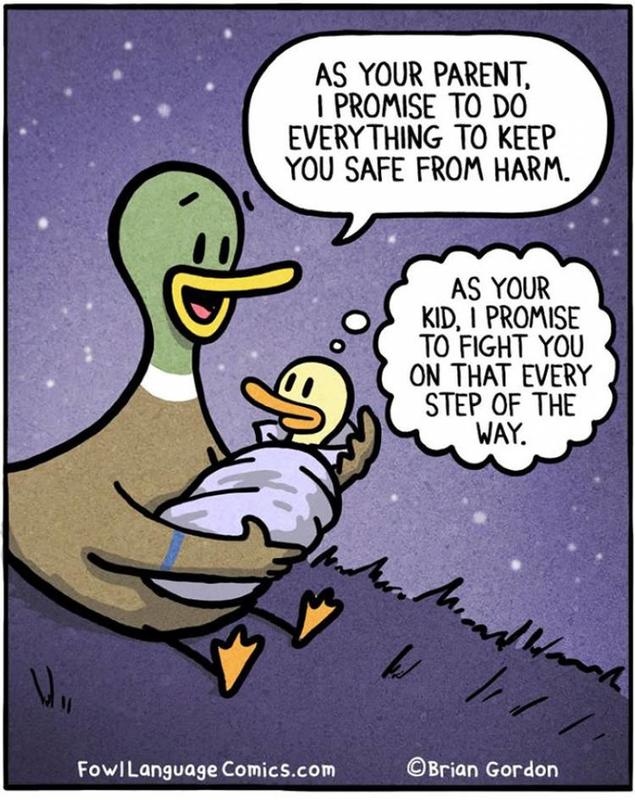
When they're teenagers, it gets even worse. Why can't they stay out all night? Why can't they go out drinking with their friends? Everyone else's parents apparently allow it, and you're the worst parent in the world. All you're trying to do is keep them safe from the people and places that might do them harm, and they can't see it. It's a thankless task. One day, though, they'll have children of their own, and they'll finally understand why you did it.
We're constantly told that we shouldn't leave our children in front of the television for too many hours at a time, and that's fair enough. There's a whole world around them, and they should be experiencing it for themselves. Children need constant stimulation, and so you should always take them on walks, and to play centers, and encourage them to develop hobbies.
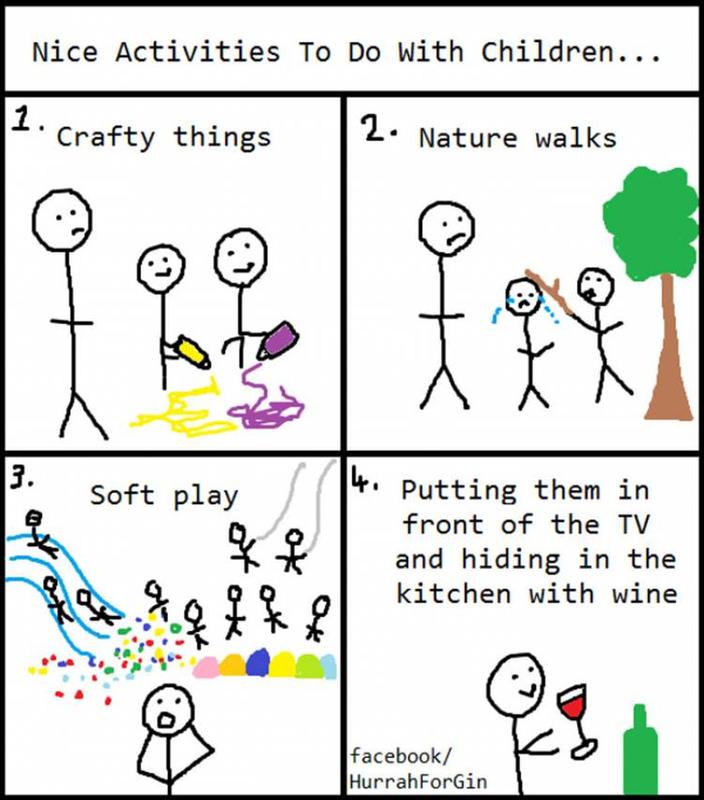
That's not always practical though. They're always capable of creating drama wherever they are, and any kind of group activity involving other children inevitably causes at least one falling-out. Sometimes - not all the time, but sometimes - there's nothing wrong with putting their favorite TV show or movie on for them and taking a few hours for yourself to quietly breathe. Just go easy on the wine, they might call upon you at any moment!
Here's some bad news for those of you who are afraid of spiders or have an aversion to wasps or bees. In fact, it's bad news for anyone who has any kind of phobia or fear of any other type of living creature at all. Your child is going to be a lot more afraid of them than you are when they're young, and you'll be expected to defend them.
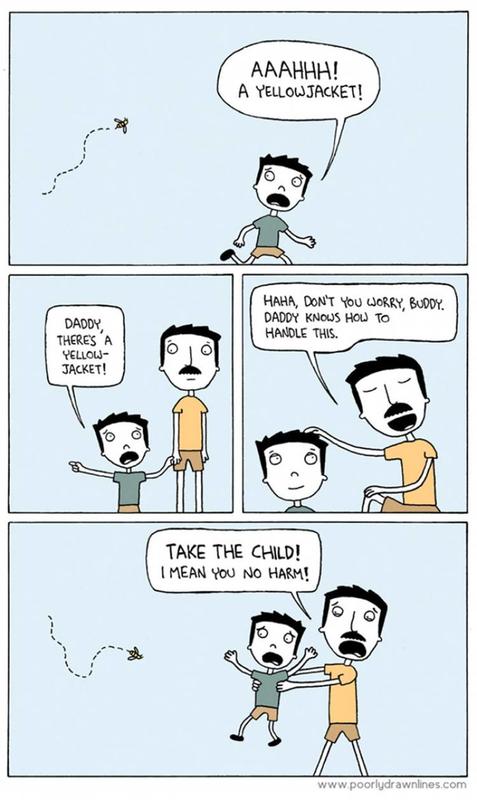
Your child doesn't care about your lifelong arachnophobia when there's a spider in the bath. They just need you to act as their personal security, and deal with the problem for you. Therapists often say that the best way to deal with your fears is to face them head on. As a parent, you'll have plenty of opportunities to do precisely that. After all, what's worse - being afraid of spiders, or letting your children see that you're afraid of them?
To you, your baby is the most adorable thing in the world. They have a name, but you have a thousand nicknames for them. Most of them are nicknames you probably wouldn't use if your friends or family could see you, but if it's just you and the baby, there's no harm done. Except, of course, when there is.

At some point, you're going to want your baby to learn their own name. They can only do that if you consistently use it when you're referring to them. If you want a baby to take information on board, you have to make sure you're giving them that information clearly, consistently and repeatedly. Otherwise, you're running the risk of your child going to nursery and introducing themselves to people as 'Mr. Snuggle Pants', which is something both they and you may find yourselves explaining to a therapist one day.
Because your child is the center of your life, it's only natural that you're fascinated by everything that they do. Every day there's a new first, and it's the most exciting thing that's ever happened to you or them. You find yourself keeping records and making mental notes to tell everybody how smart and clever your child is growing up to be.
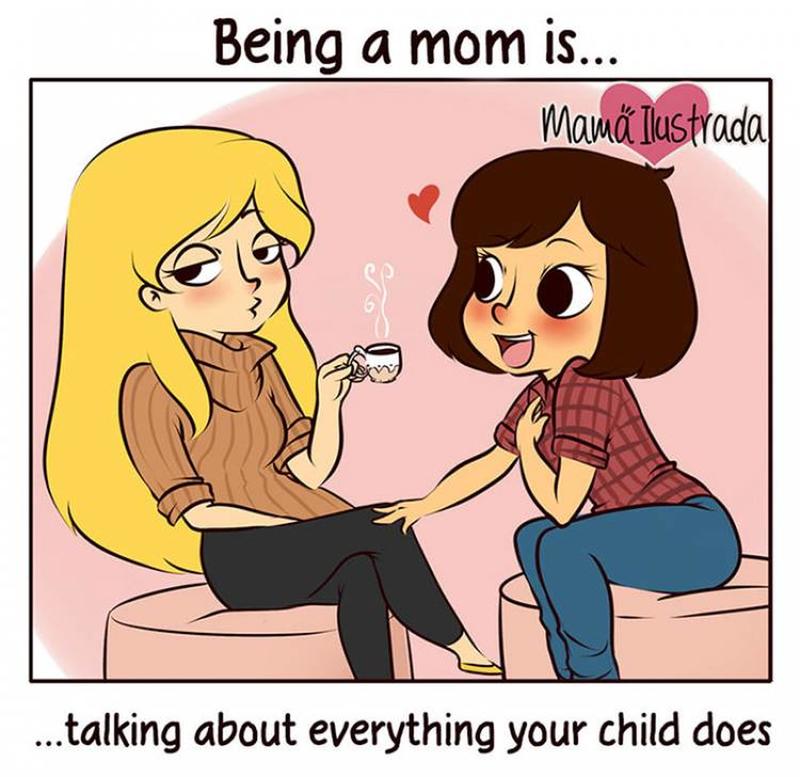
There can be such a thing as 'too much' though. It's important to keep in mind that not everyone finds your baby as fascinating as you do - especially people who don't have children of their own, and therefore don't have a frame of reference. Don't overload your friends with baby stories on the rare occasions you're able to see them - and don't forget to ask them how their own baby-free lives are going, too!
Unless you happen to be a fashion designer, dressing your child is the closest you'll ever come to running a catwalk show. You're their personal stylist, and you get to choose their outfits every day. A lot of parents take pride in that, and make sure their child looks more 'on point' when it comes to fashion than any other baby in town. That's fun for a minute, but it quickly becomes very expensive.
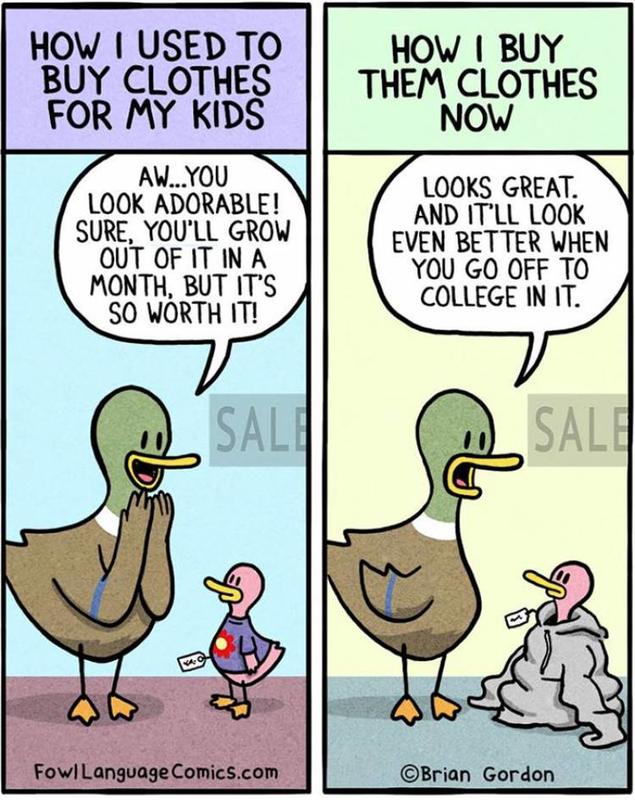
Babies grow, and they grow fast. The designer outfit you bought for them in January will be completely useless by June at the latest. Before long, you'll find yourself revising your clothes-buying strategy. Gone are the snug-fitting fashionable clothes you started them off with; now you're buying big, roomy clothes that they'll grow into eventually. It may not be fashionable, but it's a lot cheaper and much more practical!
Because you're a good parent, you'll have taken every possible step to ensure that your baby stays pain-free as much as possible. You'll never have hurt them while touching them. Because of that, they're not really aware that hurting someone by way of touch is something that can really happen. That probably goes some way to explaining why young babies enjoy clawing at your face so much.

At first, it's adorable when they keep reaching up towards you; it's like they can't stand being away from you and they want to be closer. They grab your nose, or your lip, or poke your eyes. You swear that they're doing it on purpose, but you know they're really not. You know how the old saying goes, though - no pain, no gain! Whoever came up with that expression must have been talking about parenthood.